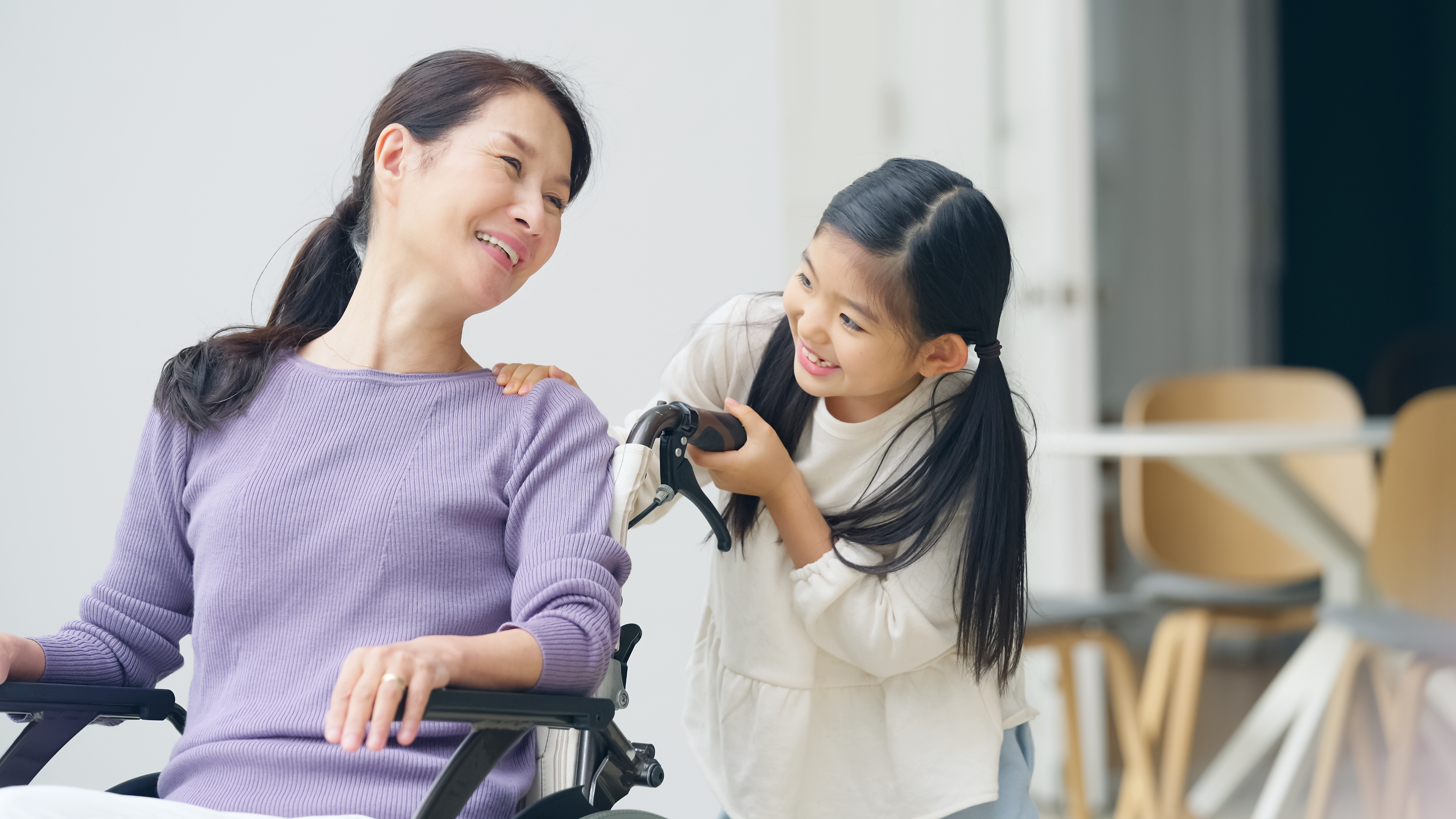
Every day, science is weaving itself more deeply into the fabric of our lives. From artificial intelligence to the Internet of Things to big data, new technologies are changing how we live now while offering a vision of the future in which many current problems will be distant memories. Yet, this vision is not shared by all. New technologies are also inspiring fear. Big data is powering medical breakthroughs, yet also raising red flags about privacy. During the pandemic, public health officials urged us to “trust the science.” But, significant numbers of people, even in highly educated societies, resisted or refused those pleas. They don’t trust science.
To build a better world, we must rebuild faith in science and technology. That needs to be an urgent priority for global leaders when they gather in Davos for the World Economic Forum in January. This year’s theme is to “focus on exploring the opportunities enabled by the new technologies and their implications on decision-making and global partnership.” However, can the partnership be truly global when so many people are apprehensive about those technologies? Our ability to solve issues such as climate change, disease, aging societies, food security and widening wealth and prosperity gaps will depend on our ability to mobilize support for and rebuild trust in science.
We at Sompo Group don’t just trust new technologies. We embrace them. In doing so, we are confident we can play a part in building a better future for our clients and society while also helping restore faith in data and technology. SOMPO is one of the country’s oldest and largest insurers, and we believe that our 135-year track record has earned us public trust. Throughout our history, we have explored and tested new technologies, then tailored them to benefit our clients. This is especially true in healthcare, where SOMPO is among Japan’s biggest providers of care for the elderly.
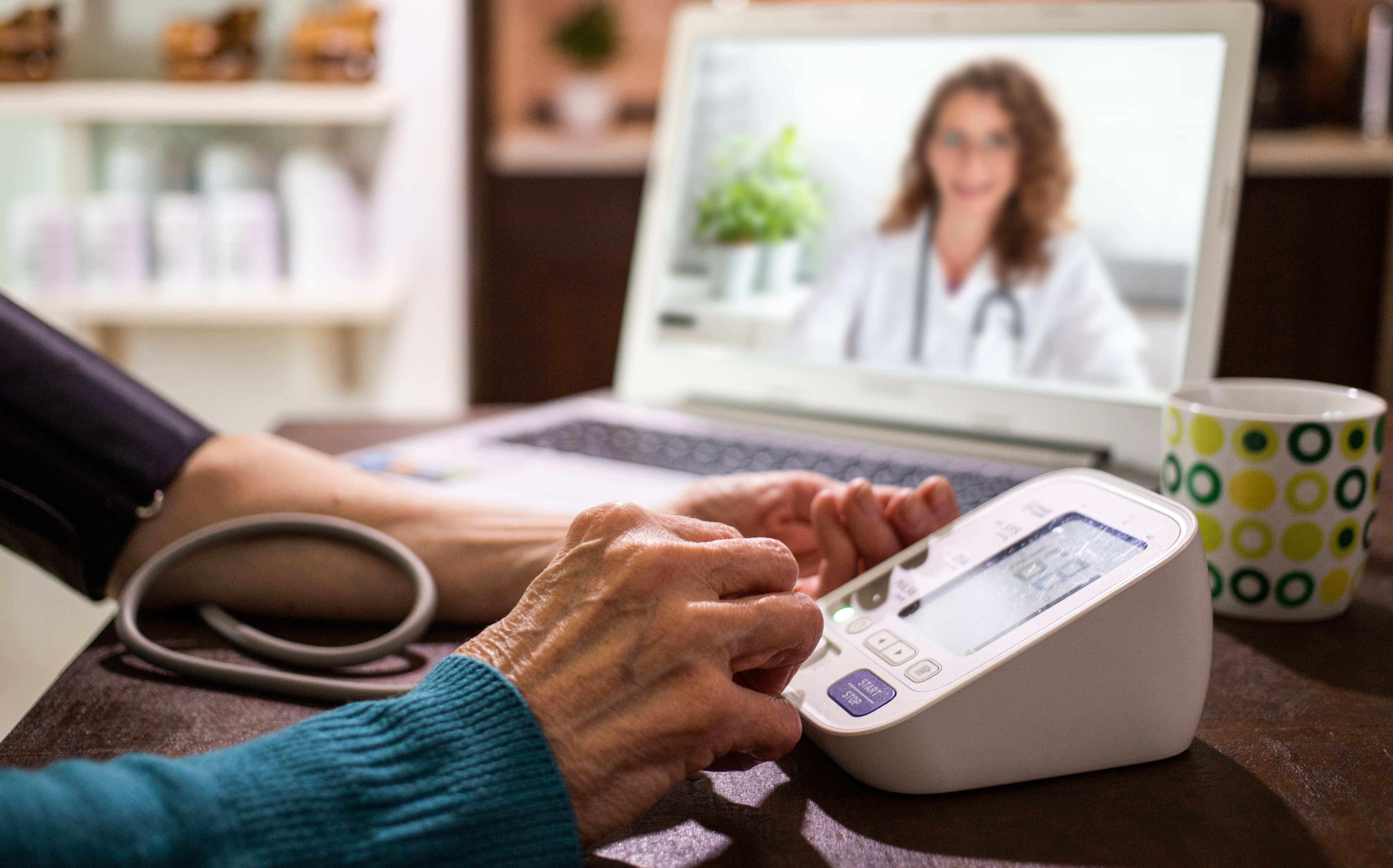
Introducing new tech to the elderly is no easy feat. Older people tend to be more reluctant to try new technologies. And yet, they stand to benefit the most from these innovations. We must ease their concerns and bring them on board to meet the challenges looming before us.
In many developed countries, the elderly are beginning to outnumber the young. These aging societies are requiring greater levels of healthcare for their graying populations. No nation knows this better than Japan. A land of 126 million, it holds the dubious demographic distinction of being the world’s oldest society, with people over 65 accounting for about 30% of the population. Japan, having grappled with this phenomenon for many years, has experiences that can offer insights–and hope–for others. Countries on many continents will soon be facing a similar situation if they are not encountering it already.
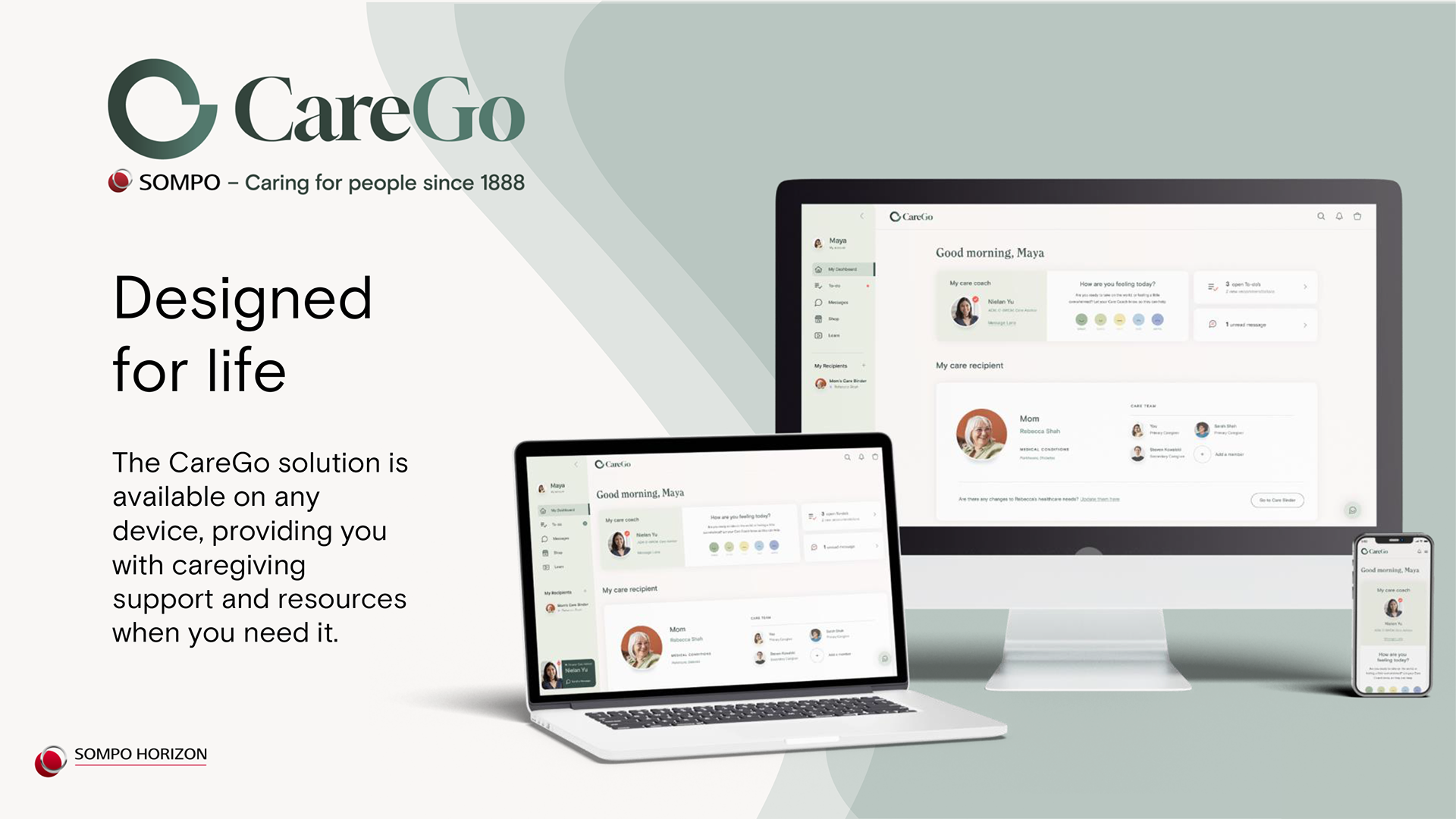
In Japan, Sompo Care, our nursing care business that operates nursing care facilities and home service offices for more than 80,000 elderly users, is employing big data, robots, artificial intelligence (AI) and the Internet of Things. Meanwhile, in the U.S., Sompo Horizon’s platform, CareGo, is developing innovative solutions for staying healthy and independent so more of us may remain at home, living with dignity, as we age. It also provides resources and support for caregivers and family members providing care for their loved ones.
CareGo, Sompo Horizon’s innovative digital platform infused with a human touch, is crafted with caregivers at its core. Recognizing that a significant portion of the workforce also assumes caregiving responsibilities at home, CareGo supports working family caregivers with a comprehensive suite of resources, support mechanisms, online tools, and live coaching sessions. This enables employers to support their employee’s caregiving responsibilities, which increases employee retention and reduces turnover. CareGo’s Care Advisors are licensed or certified professionals who offer personalized plans, support, and guidance to caregivers to help reduce burnout.
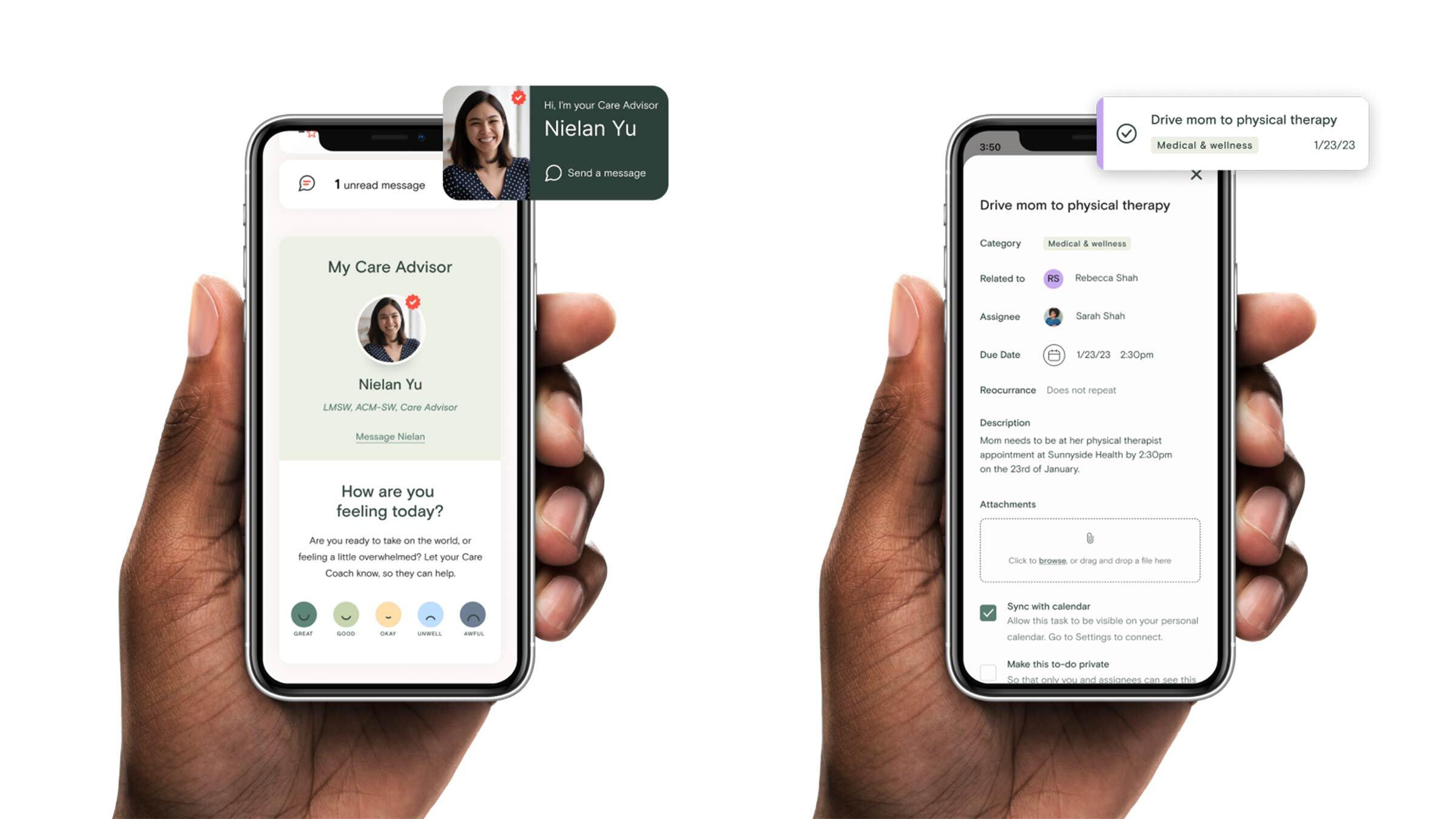
Sompo Horizon also collaborates with partners such as Salesforce and others to power its platform with cutting-edge capabilities and offers a plethora of products and services from trusted and vetted vendors to facilitate caring for their loved ones. This liberates caregivers, contributing to their well-being. Sompo Care and Sompo Horizon could not achieve these objectives and their transformative impact without relying on science and technology.
There is no other option. Elder care in Japan and other countries is in crisis. We have too few nurses and caregivers to keep pace with the rapid rise in the number of elderly. Japan’s nursing care industry is projected to suffer a shortfall of about 320,000 workers in 2025 and as many as 690,000 by 2040. Those who provide care are facing stress, burnout, and other issues as caseloads increase, and they struggle to serve more elderly people. Clearly, elder care is an industry ripe for innovation and change.
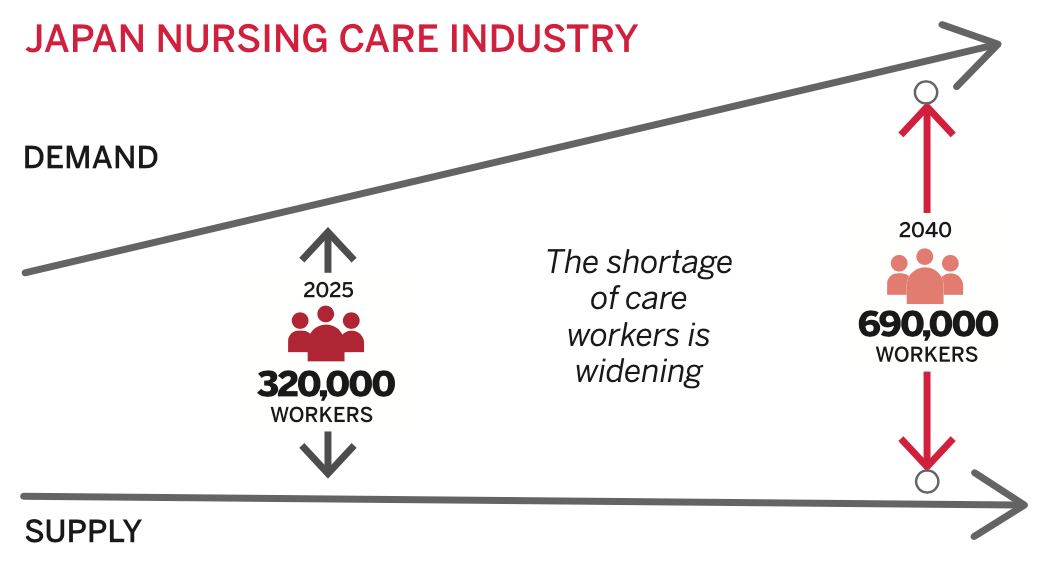
Sompo Care is dedicated to reinventing caregiving by blending advanced technologies with a human touch. That last point is extremely important because no one wants to live out their days in a cold, lab-like environment at the mercy of machines. Sompo Care has developed a unique solution, egaku, through its research and approach, guided by its philosophy: respect for people.
In English, egaku can mean to draw, paint or use one’s imagination. In some respects, this speaks to how we use big data and AI to paint a detailed and intimate portrait of a user, their health, their needs and what we can predict about what lies ahead for them. Prediction and prevention are, in their ways, imaginative. In SOMPO’s case, however, imagination doesn’t arrive out of thin air. With data as its foundation, our AI-enabled system can forecast necessary interventions for a user before their status becomes acute or critical.
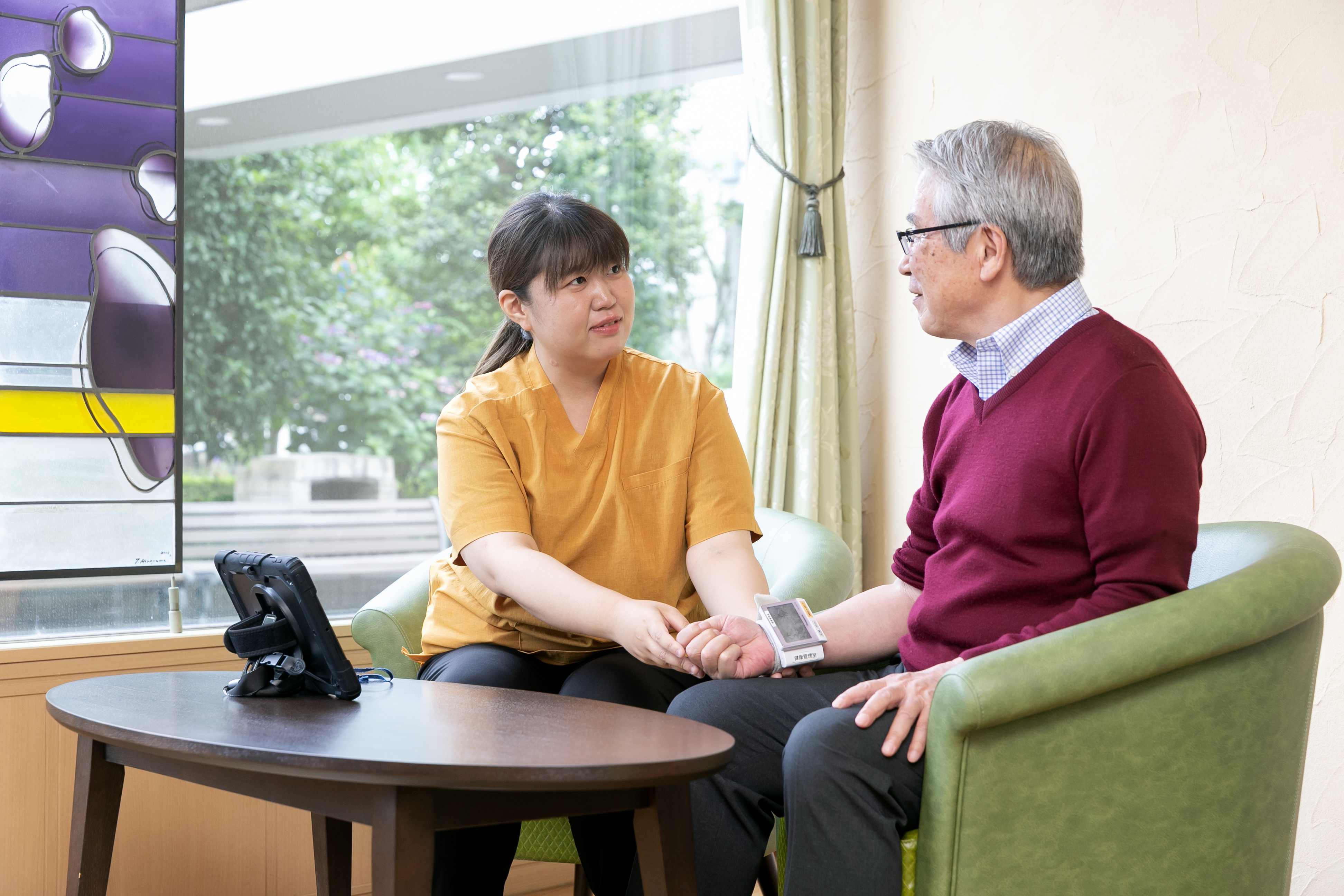
This approach is also helping to alleviate the staffing shortage. Armed with up-to-the-second detailed data and case history, nurses and caregivers work more efficiently, prioritizing users in the greatest need at the moment and delivering personalized assistance based on in-depth information. It may seem counterintuitive, but providing more personalized care in this manner actually reduces the workload for caregivers. The results are right out of Goldilocks: neither over-servicing nor under-servicing users – the level of care is just right.
That was the case with one of our residents who needed bathroom assistance several times during the night. By analyzing her data, caregivers were able to predict when she would need their help and were ready and at her side. That eased her anxiety and reduced the number of times she needed assistance. She used the bathroom less often at night, got better sleep, became more active during the day, interacted with other residents, and felt happier. Data alone could not have achieved that result. The essential ingredient was egaku.

A cornerstone of Sompo Care, egaku conforms to the company’s human-centered philosophy of serving the elderly and society. Although robotics, machine learning and AI are becoming ever more essential in healthtech and other fields, we mustn’t make the mistake of allowing technology to dehumanize what we do. The elderly, and the rest of us, will always require human contact, emotional connections and a personal touch.
Amid the rapid rise of advanced technology, SOMPO remains committed to its corporate mission of building security, health and well-being. We can’t achieve those, however, in isolation. When some people, communities or nations lack security, health and well-being, then we all do. With that in mind, we believe Sompo Care’s nursing-care expertise and approach can be a model for other countries. It is something to be shared, and we have begun exporting it. Recently, Sompo Care partnered with KB Financial Group in South Korea to train and educate members of Korea’s nursing care sector in adapting and applying new technologies in their work, facilities and institutions.
We welcome any opportunities to do the same for others around the world. As we do, we will continue to stress our faith in technology while also emphasizing egaku and CareGo. Because providing care for people is an art as well as a science. You can trust us about that.
- How Donald Trump Won
- The Best Inventions of 2024
- Why Sleep Is the Key to Living Longer
- Robert Zemeckis Just Wants to Move You
- How to Break 8 Toxic Communication Habits
- Nicola Coughlan Bet on Herself—And Won
- Why Vinegar Is So Good for You
- Meet TIME's Newest Class of Next Generation Leaders